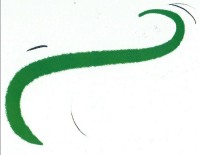|
 GREENSCARF is
the beginning of a new venture, writing
and on line, not film making, my
previous profession. GREENSCARF is
the beginning of a new venture, writing
and on line, not film making, my
previous profession.
My 'GreenScarf'
project comes from trying to understand
a modern feeling -- shared by many -- of
being trapped in 'environmental'
problems no one seems able to solve,
often even address. Insects are
declining -- what do we, individuals do?
Micro-plastics are in human
tissue....The horror of nuclear was will
not leave us.... I am trying to address,
through human stories, here a historical
one >>>>the nature of
this trap.
We invent
things, cars, a power grid, atomic
weapons for our own
benefit, only to find they have
problems, for example, produce an excess of carbon,
for which there is not, as yet, any
right way to go back or go forward.
Humans
are trapped in the technologies we
develop?
Yes, no,
maybe.
I think
it is a problem. It's poignant.
I -- say
-- have a job thirty miles
away, no public transport. I don't want
to use the car, and have no other access
to work. Buy an electric car? Maybe it
helps.
I should
have a job closer to home. I was turned
down for them and offered this good
opportunity. I have to use the car. It
is no good telling me there should be
more buses. There are a few buses but
we've built factories and shops in such
a dispersed manner than buses can't
serve them all. I could get to work by
bus if I had three hours spare each
morning.
I am part
of a generation that built these
dispersed offices, factories, houses on
the assumption that getting around by
car was efficient -- it is. I -- this
generation -- don't mean malice. I can't
afford an electric car -- this present
one is not paid for yet. And there are
no jobs close to where I live.
I think I
am saying that 'the environment' is
inside and not outside us, that the
problems we create, too much carbon
release, too much packing used, new
houses we need where there used to wild
meadow... these -- our 'footprint' -- is
not developed with malice.
Our
central heating, our shopping, our
transport, even our flights abroad are
what we need. If we can cut back
on them, there is certainly not much
popular will for that. Look at the
biggest recent protest in Europe, the
yellow jacket protest. It was against a
French government plan to raise fuel
prices. The government wanted to reduce
gasoline use or make people drive less
fast. France was brought to a standstill
by what to some was a reasonable green
proposal.
Governments that promise growth are
elected. While they say they will
integrate that growth with green plans,
there are only trivial signs of this.
The growth comes before the green.
Carbon use goes up year by year in a
decade of pledges to release it. Look at
future predictions for the growth in air
traffic or plastic.
The graph
of expected use goes up and up and up.
What can
we do? Hold up the motorway and get
eight years in jail for demanding an end
to oil.
Even if
footprints are reduced (carbon per
person in Britain is well down) the
world is, rightly enough, pledged to
pulling people out of poverty and that
means, unless you are starry-eyed,
pushing them into carbon use.
I feel
this trap and I've tried to write about
it in historical setting
and hope to use the GreenScarf concept
to see if there are new ways of looking
at the problem.
As said,
the first
GreenScarf
story I have developed is historic. It
is about individuals not
inclined to take an interest in advanced
weaponry, yet seeing that, with Germany
attacking,
the greatest scientific power, not to
develop such weaponry may lead to a
defeat by fascist armies. |